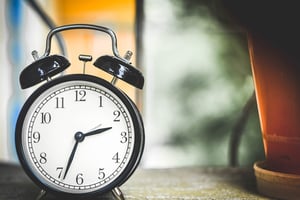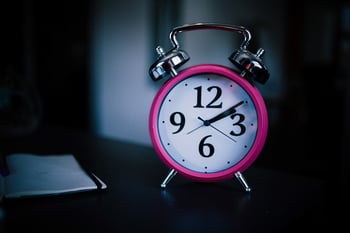Many of us have heard over the years that it’s in our best interest to get 8 hours of sleep each night. Ever wonder how accurate this is and if it really pertains to you? Also, is it simply the number of hours we sleep that matters or are there other aspects to consider?
Let’s explore diverse factors related to this topic to discover if in fact the 8 hours of sleep golden rule really holds true.

Do We All Need the Same Amount of Sleep?
The very first thing to keep in mind is that the amount of sleep we require varies by age. According to the National Sleep Foundation, the hours of sleep we need actually fluctuates over the course of a lifetime from a high of 17 hours as newborns to a low of 7 as adults. Take a glance below for the National Sleep Foundation’s recommended range of sleep hours per age group.
Notable on this chart is that 8 hours turns out to be the average number of sleep hours suggested for adults only. For all other age groups, the average number of hours of sleep recommended exceeds 8, (except for older adults who require slightly less).
With regard to adults, some will experience 8 hours as golden, while others may do fine with 7 hours of sleep. For still other adults, they’re simply not going to feel truly well-rested or energized unless they get 9 hours of shut eye. In short, it’s essential for each of us to hone-in on how we’re feeling and to assess the amount of sleep we need in order to thrive and be our best.
Assessing Your Sleep Needs
Chances are you’re sleep deprived if you can only get started and through the day with multiple cups of coffee, habitually sleep in on weekends, frequently feel irritated, or find yourself dropping the ball at work. If this sounds familiar, there’s no time like the present to slowly but surely increase your hours asleep.
If you discover you thrive on 8.5 hours of sleep, try your best not to compare yourself to others who need less. The key again is to become more aware of your authentic sleep needs and embrace rather than fight or disregard them.
The Impact of Sleep Deprivation
For people who insist they can get by with less than 7 hours of sleep, that may be the case, but it’s not likely. In Why We Sleep: Unlocking the Power of Sleep and Dreams, Matthew Walker, Ph.D. explains that you don’t know how sleep-deprived you are when you’re sleep-deprived. With chronic sleep restriction over months or years, an individual will actually acclimate to their impaired performance, lower alertness, and reduced energy levels.¹
Moreover, Dr. Walker indicates that sleep loss inflicts devasting effects on the brain and body and is linked to Alzheimer’s disease, anxiety, depression, bipolar disorder, suicide, chronic pain, stroke, cancer, diabetes, heart attacks, infertility, weight gain, obesity, and immune deficiency. In short, no facet of the human body is spared the crippling effects of sleep loss.²

Sleep Quantity vs. Sleep Quality
Let’s say you determine that 8 hours of sleep is actually golden for you. You go to bed each night by 10pm and get up at 6am and generally feel amazing. What happens though if you shift your bedtime to 1am and wake up at 9am? You’d still be getting 8 hours of sleep, but would you continue to feel as terrific and refreshed as before? Not according to neurologist Kulreet Chaudhary, MD.
Dr. Chaudhary notes that the deepest and most regenerative sleep occurs between 10pm-2am. This is relevant since the more deep sleep we get, the more muscle repair and body restoration take place. Moreover, Chaudhary states that if your body is chronically deprived of regenerative sleep, then you may still feel fatigued when you wake up.
In short, she claims timing your sleep is like timing an investment in the stock market-it doesn’t matter how much you invest, it matters when you invest. It also matters how you invest. Your bedroom atmosphere, routine, mattress, and caliber of pillow all need to be addressed. These environmental factors, especially mattresses, will vary from person to person, but they do make a difference in sleep quality.
The New Golden Sleep Rule
In conclusion, rather than 8 hours continuing to be hailed as the golden rule for sleep, it seems best to consider it as more of a guideline. In its place, I propose a new golden sleep rule accounting for age and hours of sleep needed by an individual. It’s also important to stick to a 10:00-10:30pm bedtime. This makes for a far more comprehensive, personalized and likely way to achieve greater sleep success and well-being.
Alaska Sleep Clinic is the most comprehensive sleep lab in Alaska. Call us today for a FREE sleep assessment.

Guest Author Bio:
For the past twenty-four years, Susan D’Addario, LCSW and Certified Sleep Science Coach, has helped hundreds of people to make meaningful and long-lasting changes in their lives. Susan was drawn to sleep coaching as a result of her own struggles with sleep which ultimately resulted in her falling asleep behind the wheel. That moment changed Susan’s life and career path and she was determined that no one else should go through that kind of life-threatening situation. After extensive independent study and research on sleep, Susan became a Certified Sleep Science Coach and opened her sleep coaching practice, Back to Sleep.
¹ Walker, M. PhD, Why We Sleep: Unlocking the Power of Sleep and Dreams, (New York: Scribner, 2017): 137.
² Walker, M. PhD, Why We Sleep: Unlocking the Power of Sleep and Dreams, (New York: Scribner, 2017): 133.








